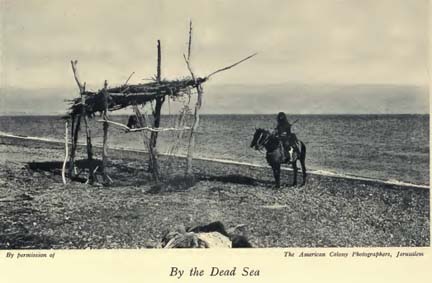
As begun in a previous post, here is another excerpt from Philip J. Baldensperger’s The Immovable East, published in 1913, and available for free as a pdf at archive.org.
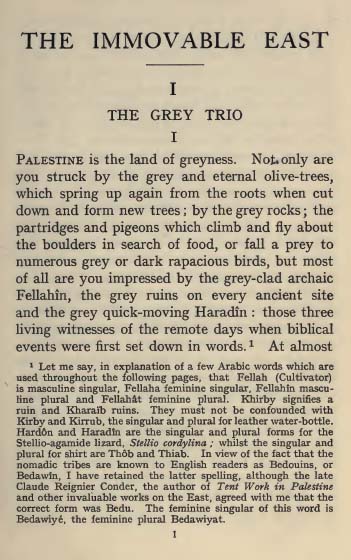
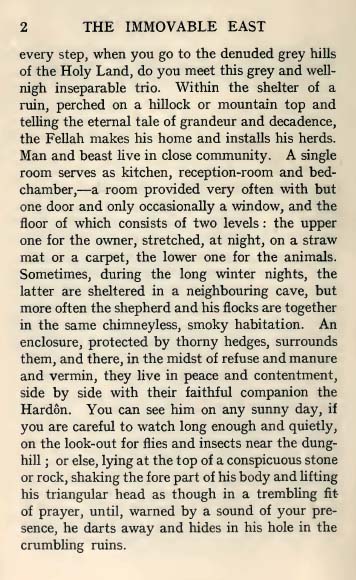

As begun in a previous post, here is another excerpt from Philip J. Baldensperger’s The Immovable East, published in 1913, and available for free as a pdf at archive.org.


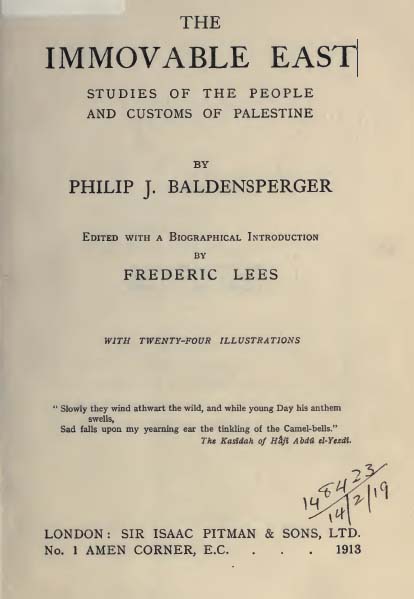
The land currently contested by Israelis and Palestinians has a long history of being contested. In the 19th century, when the area was under Ottoman control, several foreign missionaries settled in the land where Jesus walked. Philip J. Baldensperger, born in 1856, was the son of an Alsatian missionary living near Jerusalem. As a boy who grew up in Palestine, he learned first hand many of the customs and wrote his observations down. His magnum opus is The Immovable East, published in 1913, and available for free as a pdf at archive.org. I attach here the introduction to the work by the bibliophilic Frederic Lees. The pictures are well worth looking at the text, which is a fun read with banal Orientalist trimmings of an area where politics rules the day as never before.
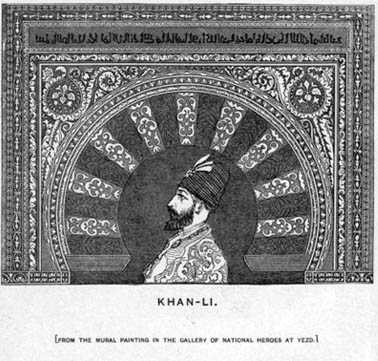
There was a time when “Oriental Tales” were the rage of the age. Montesquieu penned Lettres Persanes in 1721 and Oliver Goldsmith followed up several decades later with The Citizen of the World. But I recently came across a late 19th century text about a future visit of a Persian Prince and Admiral to the ruins of a land known as Mehrica. This is The Last American and purports to be the journal of Khan-Li, a rather bizarre name for a Persian but so thoroughly Orientalist in mode. The Introduction to the text was provided in a previous post.
It is quite apt that the epigraph for the book is a dedication to “the American who is more than satisfied with himself and his country.”
Given the recent “Occupy Wall Street” interest, here is a century old look at what it might have been in ruins…
Continue reading The Last American #2

There was a time when “Oriental Tales” were the rage of the age. Montesquieu penned Lettres Persanes in 1721 and Oliver Goldsmith followed up several decades later with The Citizen of the World. But I recently came across a late 19th century text about a future visit of a Persian Prince and Admiral to the ruins of a land known as Mehrica. This is The Last American and purports to be the journal of Khan-Li, a rather bizarre name for a Persian but so thoroughly Orientalist in mode. The admiral visits America in 1990 ( a century after the book was written), when American is in ruins, following the massacre of the Protestants in 1907 and the overthrow of the Murfey dynasty in 1930. But let the introduction to the text set up the marvels…
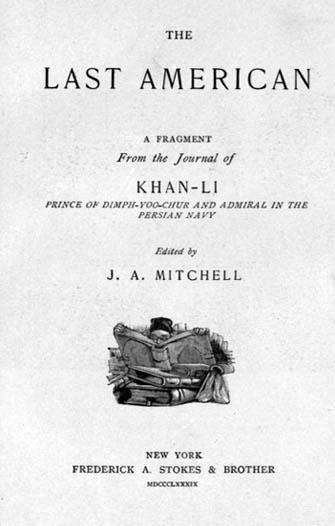
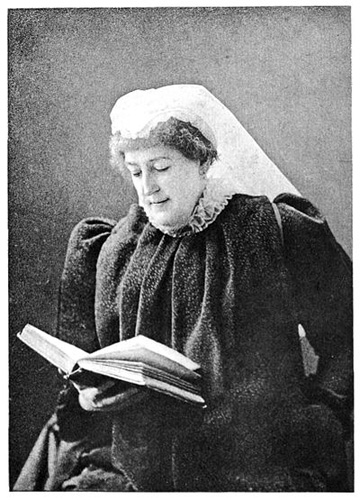
Lady Isabel Burton, wife of Sir Richard Francis Burton
[The following is an excerpt from The Romance of Lady Isabel with her reflections on visiting Jedda on the way to India in 1876. The entire book is available online.]
I was delighted with my first view of Jeddah. It is the most bizarre and fascinating town. It looks as if it were an ancient model carved in old ivory, so white and fanciful are the houses, with here and there a minaret. It was doubly interesting to me, because Richard came here by land from his famous pilgrimage to Mecca. Mecca lies in a valley between two distant ranges of mountains. My impression of Jeddah will always be that of an ivory town embedded in golden sand.
We anchored at Jeddah for eight days, which time we spent at the British Consulate on a visit. The Consulate was the best house in all Jeddah, close to the sea, with a staircase so steep that it was like ascending the Pyramids. I called it the Eagle’s Nest, because of the good air and view. It was a sort of bachelors’ establishment; for in addition to the Consul and Vice-Consul and others, there were five bachelors who resided in the building, whom I used to call the “Wreckers,†because they were always looking out for ships with a telescope. They kept a pack of bull-terriers, donkeys, ponies, gazelles, rabbits, pigeons; in fact a regular menagerie. They combined Eastern and European comfort, and had the usual establishment of dragomans, kawwasses, and servants of all sizes, shapes, and colour. I was the only lady in the house, but we were nevertheless a very jolly party. Continue reading Lady Burton in Jeddah
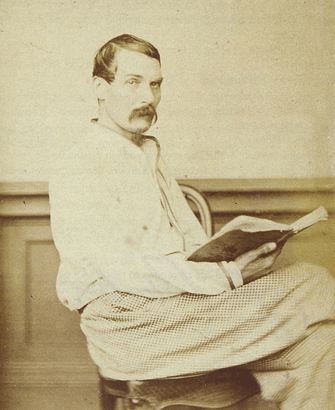
Burton in Aden
Today is March 19. Exactly 191 years ago, at 9:30 in the evening in the British town of Torquay in Devon the future Sir Richard Francis Burton was born. Like his 2oth century acting namesake, Burton was a character for the ages. He reveled in adventure and eroticism, for which he was much reviled in public and no doubt admired in private. If any one word can be used to described the persona that Burton pursued it would be “swashbuckling” in life as in spirit. My point today is neither to praise this flamboyant quasi-Victorian Caesar nor bury him (his grave is indeed a monumental site to behold). May his dry bones rest in the kind of peace he never seems to have found in life.
Burton’s biographers are numerous, as befits someone who is remembered as larger than life. His prolific corpus is now almost entirely online in various formats, but the place to start is burtoniana.org. There is much to question and quibble about in Burton’s exploits. Was his surreptitious entry into Mecca, disguised as a pilgrim, a travesty of Islamic values? Did his fascination with erotica in an age of gentlemananged taboos overstep ethical bounds? Was he the bad kind of “Orientalist,” a discourse cum intercourse voyeur that warrants calling him “Dirty Dick”, as Edward Said does in Orientalism (p. 190)? Was he, perhaps, a bit mad in that ubiquitous England manner?
Whatever you might think of the man, it is probably because of what you have read about him rather than what he actually wrote. Regardless of what he is saying, it must be noted that he had an extraordinary capacity for learning languages. Below is a list of the languages and dialects he is said to have mastered to some extent:
English, French, Italian, Latin, Greek, Jataki dialect (he wrote a grammar), Hindustani, Marathi, Urdu, Arabic, Persian, Pushtu, Sanskrit, Portuguese, Spanish, German, Icelandic, Swahili, Amharic, Fan, Egba, Ashanti, Hebrew, Aramaic, Many other West African & Indian dialects
I suspect he would get into Harvard, no matter what his SAT score.
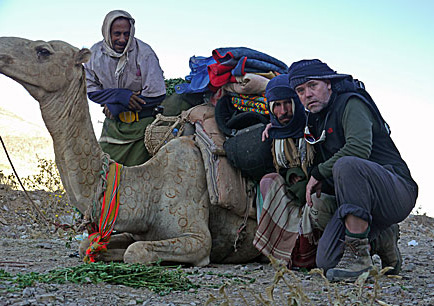
by Iona Craig, The National, January 9, 2012
A Swedish adventurer crossing Yemen by camel hopes his journey will encourage tourists to see beyond the political turmoil and violence that has engulfed the country for nearly a year.
Mikael Strandberg set out on December 7 on a 380-kilometre trek across the treacherous highlands, the first leg of his Yemen venture, to disprove the purveyors of pessimism.
“I don’t know what they [the tourists] are waiting for … it is such a wonderful country with great potential,” he said, after arriving in Sanaa after a two-week march through the toughest terrain in the Arabian Peninsula.
Along with two Yemeni companions, Mr Strandberg is in the initial phase of a journey that will cross the country from the western coastal plains of Hodeida to the edge of the world’s largest sand desert, the Rub’ Al Khali, or Empty Quarter, and beyond to Oman.
The explorer, 48, who fell in love with both the country and his wife Pamela, an American, during a visit to
Yemen three years ago, holds fond memories of Sanaa and the Yemeni people.
“We decided to go and try to make a difference and give a different perspective from the one portrayed by the media,” said Mr Strandberg. Continue reading A Swede and a camel in Yemen
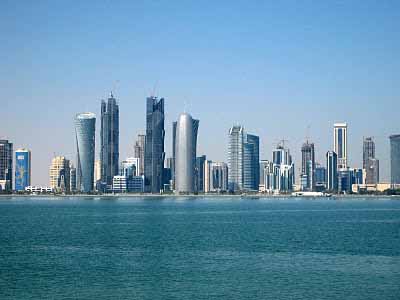
Qatar: Religion, Economy, and Sustainability
A course offered in Qatar for the Spring Term 2012 (Travel: March 24 — April 5, 2012)
Led by: Tugrul Keskin, PSU — International and Middle Eastern Studies Middle East Studies Coordinator (INTL)
Over the last twenty years, with the emergence of the global economy, Qatar has become a center of an economic boom in the Persian Gulf. This economic transformation has also shaped the social and political characteristics of Qatar. In the Gulf region, Qatar has one of the fastest growing education systems, increased levels of women’s participation in education and the workplace, and more open media and communications systems. Therefore, Qatar uniquely represents a new trend in the Middle East. In this study abroad course, we will explore and try to understand these changes based on our interactions with Qatari organizations, politicians, citizens, educators and etc.
Study abroad in Qatar offers students the unique opportunity to understand religion, economy and sustainability from the perspective of course materials in addition to discussion with community members and leaders, and visits to historical venues. This will help to contextualize the inter-relationships between contemporary Qatari society, and its historical, economic and geo-political underpinnings. It will enable students to interact with and directly explore issues that are core to the Muslim Societies. Continue reading Study this Spring in Qatar